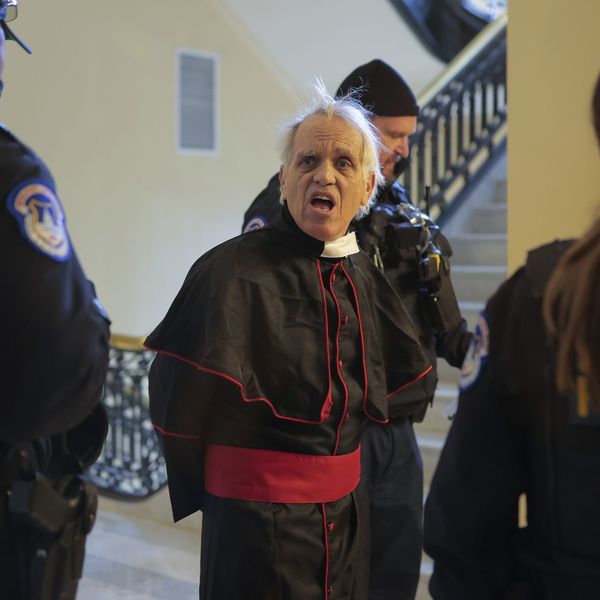The immediate policy response to urban rebellion in Baltimore on Monday night came, somewhat surprisingly, from former Secretary of State Hillary Clinton, who just launched her campaign for the 2016 Democratic nomination.
Clinton's first major policy speech made criminal-justice reform the core of her incipient campaign. She acknowledged that racial unrest in Ferguson, Missouri, Baltimore, Maryland, and Staten Island, New York, have revealed patterns of inequality that are "unmistakable and undeniable." She drew from the work of policy scholars, most notably Michelle Alexander, who have documented mass incarceration's broader impact on African-American communities and the larger society.
Years from now historians might label this speech as Clinton's reverse "Sister Souljah" moment.
During Bill Clinton's first run for the presidency, in 1992, he sought to establish his mainstream credibility by hijacking a Jesse Jackson Rainbow/PUSH conference and chastising black activist Sister Souljah for her provocative remarks about the Los Angeles riots. Now Hillary Clinton has used a predominantly white policy forum to implicitly repudiate the racist policies and politics that have shaped American urban policy over the past three decades.
Against a national political backdrop of thousands of police and National Guard troops patrolling Baltimore, Clinton publicly called for the end of mass incarceration in America. Is it a coincidence that Clinton was speaking on the 23rd anniversary of the Los Angeles uprising in the wake of the acquittal of four Los Angeles Police officers in the videotaped beating of black motorist Rodney King?
The former New York senator asked Americans to confront "hard truths about race and justice." She listed the deaths of Baltimore resident Freddie Gray, Ferguson's Michael Brown, Cleveland's Tamir Rice, South Carolina's Walter Scott and Staten Island's Eric Garner as part of a roll call of black men and children killed by the police.
Clinton was taking another step away from her husband's political positions. President Bill Clinton played a leading role in advocating, implementing and normalizing "tough on crime" policies that ultimately amplified racial inequality in the U.S. criminal-justice system. Clinton administration programs redirected vital resources away from the urban poor and toward widespread prison construction and mandatory minimum sentences. His punitive social policy made it increasingly difficult for ex-offenders to receive public housing, food stamps and other crucial support.
The brutal combination of the Clinton administration's crime and welfare reform bills essentially relegated two generations of poor black people to the margins of American society. They help account for the 1.5 million "missing" black men that Hillary Clinton talked about in her powerful speech, citing a recent New York Times story.
Violence in Baltimore is the bitter harvest of public policy debates about the poor, black and young that African-Americans invariably lost during the past two generations. The shift from the hopeful, if poorly resourced, goals and ambitions of the Great Society programs of the 1960s gave way, by the 1980s and 1990s, to a bi-partisan embrace of neo-liberal crime policies that gutted the welfare state and created a racial caste system that has been identified as the "new Jim Crow."
The federal war on drugs insidiously shifted antipoverty resources toward the militarization of local police forces, the institutionalization of racial profiling and brutality and the criminalization of the entire black community. Poor blacks lacked the resources, education and opportunities to escape a growing criminal-justice dragnet. Instead, they found themselves caught in the nation's ever-expanding prison gulag.
The disappearance of black men and women from urban areas is often cited as the direct result of policy choices, political scapegoating and media framing that normalizes black criminality, disparages young people as "thugs" and "gangstas," and overlooks the systematic brutality and abuse from democratic institutions, including the police.
America's unapologetic commitment to policies that have created institutional racism and de facto white supremacy is a major reason for the violence, looting and property damage that have been the focus of breathless media reports. This analysis ignores the role of state institutional violence in exacerbating tensions, as well as the inspiring behavior of thousands of community activists, civic leaders and students in maintaining peace through most of the city.
Hillary Clinton's call for ending the new Jim Crow is the politically and morally correct decision. But it's not enough. Ending mass incarceration will require enormous political will and economic resources to reorder the entire criminal-justice system.
Shutting down prisons, releasing nonviolent offenders, offering drug rehabilitation, housing, food and hope to communities of color are a small step on a long road toward full citizenship.
Baltimore, Ferguson and Staten Island exemplify the lack of equal and robust black citizenship in the United States. Equal citizens are not racially segregated, economically deprived and cut off (except via social media) from mainstream society. Nor are citizens demonized and dismissed for making mistakes, even violent ones. Consider the national response to white college students and sports fans who routinely engage in mayhem and violence after winning or losing big games.
Clinton's recognition of the decades-long grassroots movement to end the systematic incarceration of African-Americans may be considered historic, particularly if she's elected president and follows through with her bold policy initiatives. The pain and anguish and desperate hope on display in Baltimore will then have contributed to the nation's racial progress in unexpected and substantive ways.


